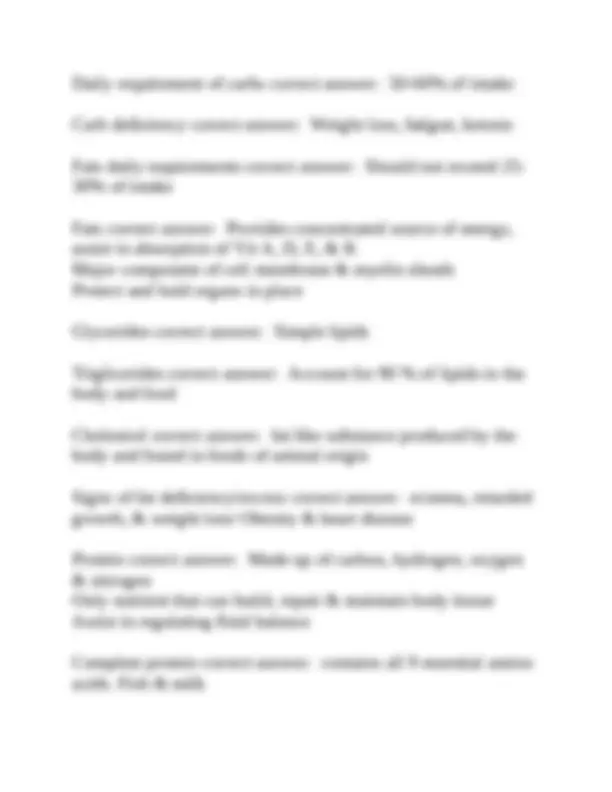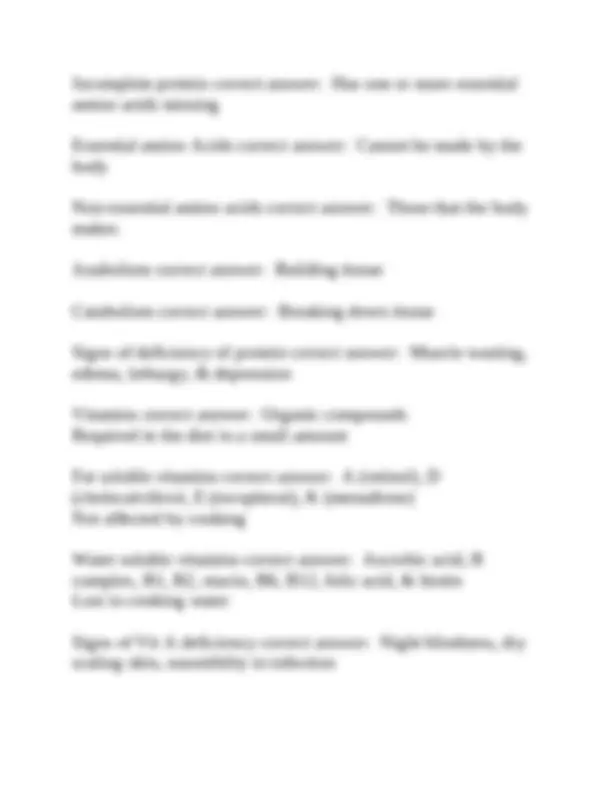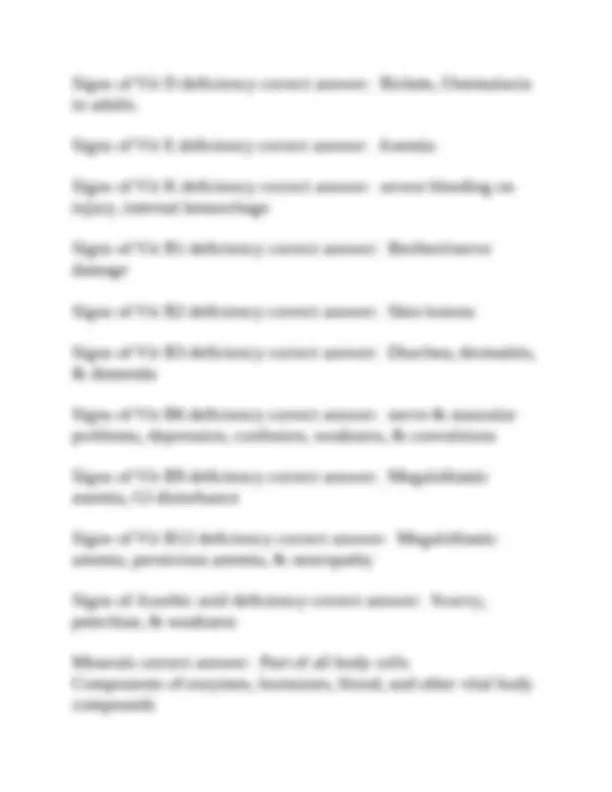





Study with the several resources on Docsity

Earn points by helping other students or get them with a premium plan


Prepare for your exams
Study with the several resources on Docsity

Earn points to download
Earn points by helping other students or get them with a premium plan
Community
Ask the community for help and clear up your study doubts
Discover the best universities in your country according to Docsity users
Free resources
Download our free guides on studying techniques, anxiety management strategies, and thesis advice from Docsity tutors
A comprehensive set of questions and answers related to nutrition, covering essential concepts such as the definition of nutrition, the digestive process, macronutrients, micronutrients, and the importance of water. It also includes information on the daily requirements of various nutrients and the signs of deficiency or excess. This resource is valuable for students studying nursing or related health fields, offering a concise overview of key nutritional concepts.
Typology: Exams
1 / 6

This page cannot be seen from the preview
Don't miss anything!




Nutrition correct answer: Study of how food nourishes the body Ingestion correct answer: Taking a food into the digestive tract Mastication correct answer: Chewing Deglutition correct answer: Swallowing Peristalsis correct answer: Serial contraction of the smooth muscles of the GI tract Absorption correct answer: End process of digestion through in the small and large intestines into the blood an lymph system Metabolism correct answer: Conversion of nutrients into energy Excretion correct answer: Process of elimination Macro-nutrients correct answer: Provide energy carbs, proteins, & fats Micro-nutrients correct answer: Vitamins and minerals Resting energy expenditure (REE) correct answer: Amount of energy required to maintain basic body function
Basal metabolic rate correct answer: Rte body metabolizes food to maintain the energy requirements of a person Ideal body weight correct answer: Weight recommended for optimal health Body Mass Index (BMI) correct answer: Reliable indicator of healthy weight normal 20-25 bmi Caloric value correct answer: amount of energy that nutrients or food supply the body Water correct answer: Most important nutrient Functions of water correct answer: Solvent, transporter, regulator, lubricant, hydrolysis The 4 ways the body looses water correct answer: Urine, feces, perspiration, respiration Signs of water deficiency correct answer: profuse sweating, vomiting, diarrhea, hemorrage, wound drainage (burns), fever, edema Dehydration correct answer: Deficiency of water Carbohydrates correct answer: Made up of carbon, hydrogen, oxygen Primary source of energy Stored in body as gycogen or fat
Incomplete protein correct answer: Has one or more essential amino acids missing Essential amino Acids correct answer: Cannot be made by the body Non-essential amino acids correct answer: Those that the body makes Anabolism correct answer: Building tissue Catabolism correct answer: Breaking down tissue Signs of deficiency of protein correct answer: Muscle wasting, edema, lethargy, & depression Vitamins correct answer: Organic compounds Required in the diet in a small amount Fat soluble vitamins correct answer: A (retinol), D (cholecalciferol, E (tocopheral), K (menadione) Not affected by cooking Water soluble vitamins correct answer: Ascorbic acid, B complex, B1, B2, niacin, B6, B12, folic acid, & biotin Lost in cooking water Signs of Vit A deficiency correct answer: Night blindness, dry scaling skin, suscetibilty to infection
Signs of Vit D deficiency correct answer: Rickets, Ostemalacia in adults. Signs of Vit E deficiency correct answer: Anemia Signs of Vit K deficiency correct answer: severe bleeding on injury, internal hemorrhage Signs of Vit B1 deficiency correct answer: Beriberi/nerve damage Signs of Vit B2 deficiency correct answer: Skin lesions Signs of Vit B3 deficiency correct answer: Diarrhea, dermatitis, & dementia Signs of Vit B6 deficiency correct answer: nerve & muscular problems, depression, confusion, weakness, & convulsions Signs of Vit B9 deficiency correct answer: Megaloblastic anemia, GI disturbance Signs of Vit B12 deficiency correct answer: Megaloblastic anemia, pernicious anemia, & neuropathy Signs of Asorbic acid deficiency correct answer: Scurvy, petechiae, & weakness Minerals correct answer: Part of all body cells Components of enzymes, hormones, blood, and other vital body compounds